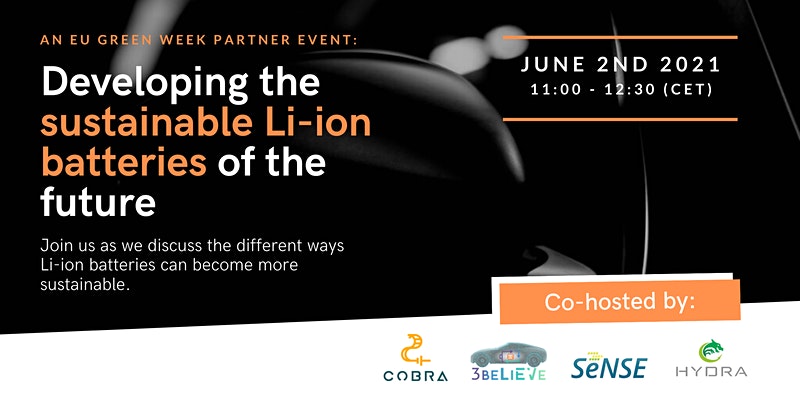The webinar began with three expert presentations followed by a panel discussion where four other professionals shared their perspectives on future challenges and improvements to reduce the impact of Li-ion batteries, taking into account the EV market as well as research and policy perspectives.
One of the main aims of the event was to highlight the work of the different LC-BAT-5 cluster projects related to Li-ion battery sustainability. Élise Monnier from CEA (representing HYDRA), kicked off the presentations by introducing the LCA methodology and its importance to offer a quantified methodology to support the sustainability discussion. The different steps in the value chain were introduced as well as their impact on the environment and how certain choices in one step of the value chain can have a positive or negative impact on the overall sustainability of Li-ion batteries.
Boschidar Ganev from AIT (representing 3beLiEVe), focused on the use phase of the battery and specifically discussed how this phase can be extended with different 2nd life applications. He explored the pros, cons and future challenges in widely establishing the 2nd use of batteries, comparing the reuse of the battery pack “as is”, to the reuse of the battery cells and other components.
The last presentation by Ruben Kühnel from Empa (representing SeNSE), shifted the focus towards the End-of-Life phase of the battery and more specifically on the recycling and recovery of materials from battery components, such as the cathode. He touched upon the potential of recycling cobalt and nickel while highlighting the importance of their recovery. Such recovered materials could replace the mining of virgin raw materials which is connected to negative social and environmental impacts, while at the same time, reducing the dependency of Europe on external value chains (as many of the raw material reserves exist only outside Europe).
The event was concluded with a panel discussion, exploring the perspectives of different battery experts from industry, policy and research:
Jan Tytgat (Director Government affairs EU-Benelux at Umicore)
Philippe Jacques (Managing Director at EMIRI and Secretary-General of the Batteries European Partnership)
Clémence Siret (Eco-Design Manager at SAFT)
Silvia Bodoardo (Associate Professor at Politecnico di Torino).
The panellists raised the most urgent problems that need to be addressed, as well as the necessary improvements to positively change the battery industry. This included the need for developing a standardised, comparable, and thoroughly defined LCA methodology, proper End-of-Life treatment of batteries – particularly recycling technologies to substitute virgin raw materials with recycled ones – as well as the need for robust regulations and due diligence on carbon footprint from battery manufacturing.



